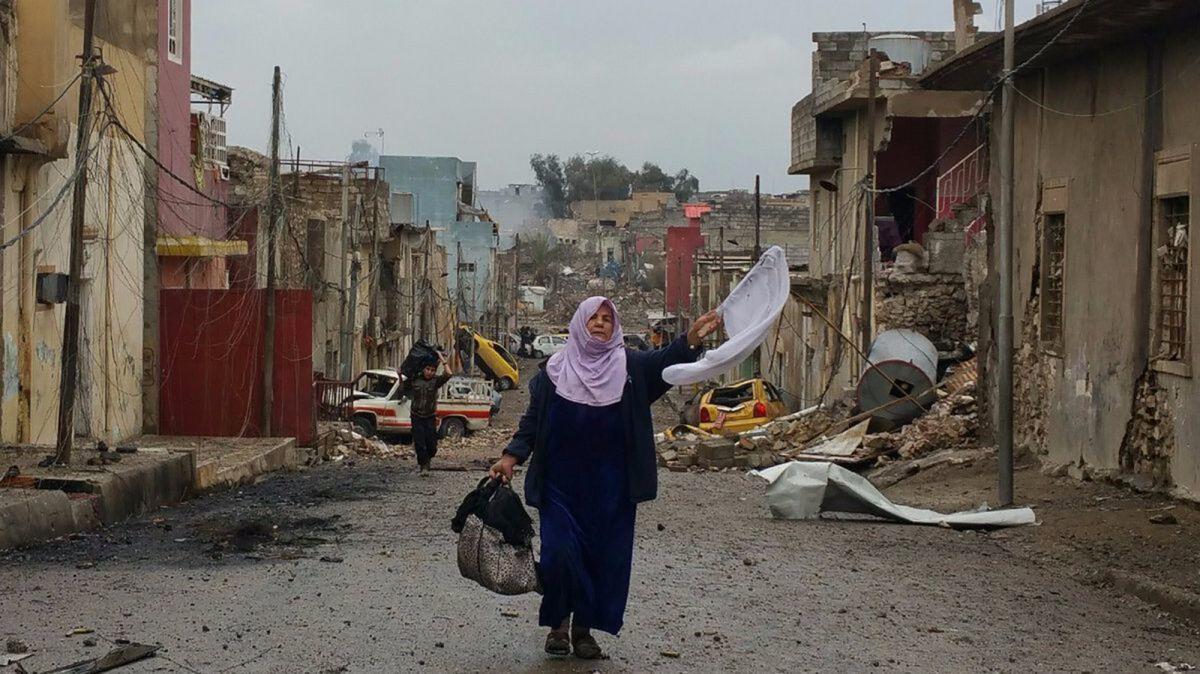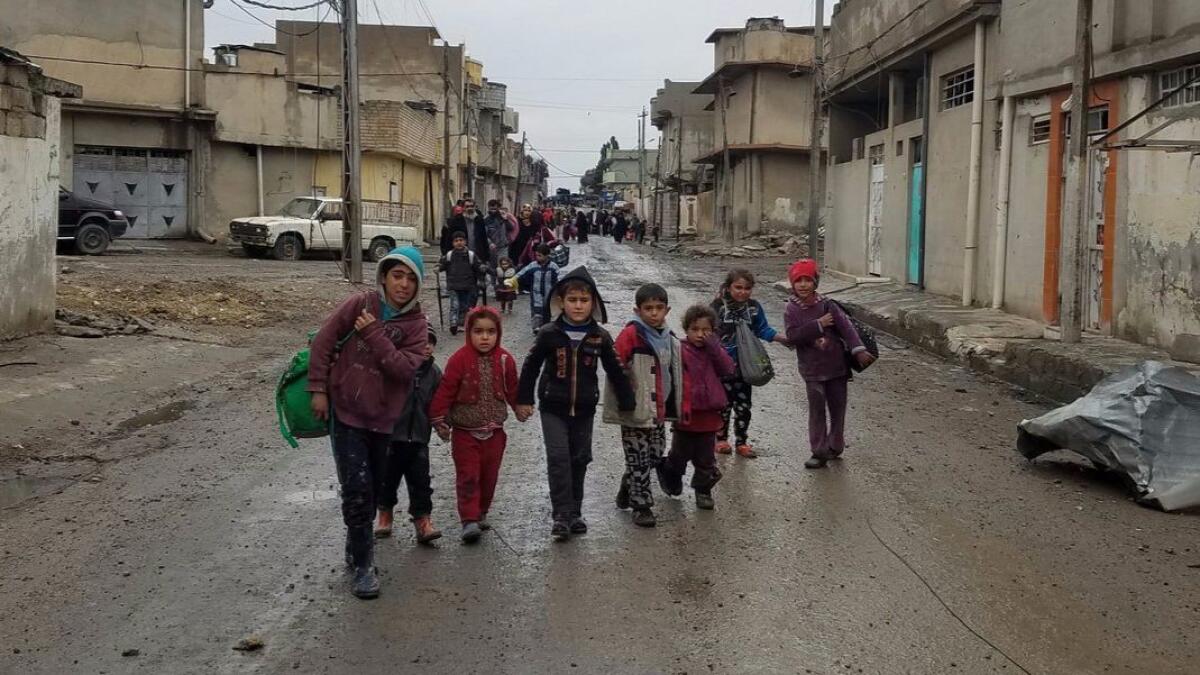In Mosul, desperate families dodge bullets to reach safety: ‘There’s a sniper here’

Residents of the Ghazlani neighborhood of Mosul continue to pour out of the city. Some flee with their whole families with them, or worry for missing loved ones. Others mourn the dead.
- Share via
Reporting from MOSUL, IRAQ — The smoke subsided, revealing some furtive movement behind the jumble of masonry that had once been a building in this ravaged west Mosul district. It was a man. He peeked around the rubble, paused a beat, then raced to the line of crumpled sedans a few yards away.
He turned, gestured to those behind him to follow, then vaulted himself over the hood of a car and ran toward the group of Iraqi troops stationed up the street.
“Stay where you are!” a soldier screamed. “Stay where you are!”
He ordered the man to strip to see if he was wearing a concealed explosives vest. The man’s pace barely slowed as he kept moving forward, shedding his coat and shirt as he went; he was down to his pants when he reached the security forces.
“Let them come, it’s fine. They have nothing on them,” said another Iraqi soldier.
Behind the man more desperate people appeared, and what had been a fitful trickle became a flood of terrified Mosul residents fleeing a neighborhood that had become a battleground. Such scenes play out day after day in Mosul — scenes marked by chaos and suspicion, but also tenderness and compassion.

The fight to drive the jihadists of Islamic State from this city is unfolding with hundreds of thousands of residents still trapped inside. Their agonizing choice: stay and hope their houses aren’t commandeered by the combatants (making them targets for opposing forces), or race through a war zone, where constantly shifting front lines mean that an improvised explosive device, mortar round, sniper’s bullet or even an airstrike could cut them down.
In the heavily contested Wadi Hajar district last week, a coalition strike on a block of buildings held by Islamic State gave residents the break in the fighting they needed to escape. Soldiers kept a nervous watch as people shuffled past lugging brightly colored suitcases — an incongruous image against the muddy streets and burned-out vehicles.
The people had questions, so many questions:
“Is it safe here?”
“Please, we can’t go on, are there any vehicles to take us?”
“Is this the right direction?”
But mostly they voiced the laments of those who had lost so much so quickly. One woman, her voice strangled with grief, repeatedly screamed that her “children were gone.” Another insisted, “I can’t breathe,” before soldiers and family members rushed to steady her. One man groaned as he pointed to a blood-stained cloth on his side that stanched a wound.
A few streets away, Staff Lt. Col. Ali Husseini, the commander of a regiment with Iraq’s elite Counter-Terrorism Service, barked at an officer to move away from a gaggle of families.
“Don’t trust them. Daesh plans and thinks more than we do — you have to always consider they can use anyone to kill you,” he said, employing the Arabic acronym for Islamic State.
“I’ve fought in Mosul from 2004 to 2010, then from 2012 to 2014, and here we are again. I’ve learned enough about the people here, and I don’t trust them,” Husseini said.
Some residents appeared stoic in the face of the carnage.
Driving through Wadi Hajar, one Humvee stopped before a young man mopping the pavement in front of his house. Staff Maj. Ammar Ubaidi, also of the Counter-Terrorism Service, cracked open the double-shielded window of the vehicle.
“What are you doing?” he asked the man, who responded with a laconic, “I’m cleaning.”
“You’re cleaning? Go inside, man. They’re throwing mortars. One of them might get you.”

On another street in the adjacent Ghazlani district, Samim Sami, a 59-year-old former employee at the University of Mosul, watched the soldiers from the doorstep of his elegant house.
“Where else would I go? I’m going to stay here and make sure everything is all right,” he said, laughing as he explained that he had stood under the door’s frame for protection. “It’s only my son and I here. My daughter, thank God, left earlier and is now in Baghdad.”
Other residents, one wearing a knee-length purple robe, came out to talk to Ubaidi, who greeted them and told them to stay inside.
Two blocks down, Ubaidi escorted an exhausted family to safety, leading them through a maze of armored vehicles and Humvees.
“Stay close to the wall. There’s a sniper here,” Ubaidi warned. The children whimpered in response.
They finally arrived at a large pickup truck that would take them to an abandoned sugar factory, a safer location until they could reach a muster point a few miles out of Mosul.
Although Ghazlani was relatively far away from the front lines, the soldiers remained tense as they watched families cram in the truck’s bed, straining to fit themselves and their belongings beside an anti-aircraft gun.
Earlier, an Islamic State drone was spotted above, its arrival heralded with a gunfire volley so unremitting that it sounded like an extended snare drum roll. It was a surveillance drone equipped with a video camera on a reconnaissance mission, several soldiers said, the prelude to a barrage of Islamic State mortar fire.
They were soon proved right.
Minutes after the pickup loaded with civilians had driven away and an officer, Federal Police Commissioner Mohammad Flayeh, began to talk to a visiting reporter, he was interrupted by a high-pitched whine. He wrenched the reporter by the shirt toward the open door of a house.
But nothing came.
“They missed us. It must have landed farther away,” he said.
He turned to walk out of the house and took just two steps onto the patio when a mortar shell slammed into the balcony by the entrance. A shower of cinder blocks fell on Flayeh and two of his subordinates.
They dragged themselves back to the house, groaning from bruises and covered in dust. They lingered for a moment, checked to see if the sky was clear and went out again.
It would be hours before the families would reach the muster point set up a few miles south of the city on the Baghdad-Mosul highway. Even there, away from the danger, their suffering had still not ended.
Iraqis call Mosul the “City of Two Springs” because its fall season is as temperate as its springtime. But on Saturday, it was cold and bleak, the rain turning the side of the road where volunteers had set up an ersatz soup kitchen into mud pits.
Many had been unable to pack necessary clothing before they made their escape. Their bare feet now sank in the mud. It splattered all the way up to their shoulders, staining their clothes a grayish-brown. They congregated near a wood fire, huddling together for warmth.
Some drivers, meanwhile, drove their cars up the highway to pick up other families and drop them off at the mustering point. One lady shivered as she stepped into the warm cab of a van. In her arms, swathed in a red and white Kuffiyah, was her week-old daughter, Rahmah.
The lady devoured the first candy bar she was given, then a second. She eyed a third.
“It’s been months since we had anything like this,” she said, a tiny smile appearing on her face.
Bulos is a special correspondent.
ALSO
The teachers are unpaid and danger is ever present, but Mosul’s schools are reopening
UAE’s minister of happiness insists her job is no laughing matter
Fearful immigrants in U.S. make perilous winter crossing to seek protection in Canada
More to Read
Sign up for Essential California
The most important California stories and recommendations in your inbox every morning.
You may occasionally receive promotional content from the Los Angeles Times.











